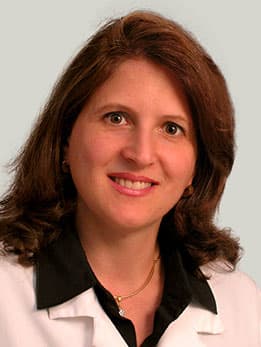The first step to losing weight: a visit to UChicago Medicine’s new Center for Weight and Metabolic Health

You know you need to lose weight. But how?
The University of Chicago Medicine’s new Center for Weight and Metabolic Health is a starting point for patients struggling to lose weight or unsure which weight-loss tools, treatment or support they need.
Launched in the summer of 2022, the center oversees several UChicago Medicine programs, including Chicago Weight (non-surgical obesity management) and Surgical Weight Loss (the Midwest leader in duodenal switch surgery to treat severe obesity).
“The idea of the comprehensive center is for all of us to work together and give patients their options up front. We tell them what their insurance will cover and what are the best outcomes given their situation,” said Mustafa Hussain, MD, director of the new center. “Not everything works for everybody, so that’s why we come up with an individualized plan.”
Several surgeons and medical specialists are involved in the Center for Weight and Metabolic Health, which serves patients at UChicago Medicine’s Hyde Park, River East and Orland Park locations.
After a call to the Center for Weight and Metabolic Health, a person is scheduled for a full physical and mental health evaluation. Then a customized weight-loss plan is designed, taking into consideration the individual’s health issues, life circumstances and weight-loss goals.
The plan could include meeting with a dietitian and/or therapist, appetite-curbing prescription medications, exploring surgical options, choosing different lifestyle choices, and addressing sleep apnea, diabetes or a combination of obesity-associated health conditions.
“What’s the downside of seeking care?”
The average person has tried to lose weight seven times and only 10% of dieters are successful, said Silvana Pannain, MD, Obesity Medicine Director and also Director of Chicago Weight. Trying to lose weight can be frustrating for many people, but it’s important because obesity is connected to more than 200 health conditions and 13 types of cancers.
Pannain said people find it hard to talk about their weight with a doctor and often blame themselves for failing at weight loss, but they shouldn’t.
“Obesity is a serious, chronic, relapsing disease. It’s a crisis,” she said. “We don’t expect patients to take the blame anymore if they’re not successful at losing weight. It means they haven’t yet found the right treatment. Patients know what they do and do not want. And if they don’t know what’s best for them, or can’t do it on their own, we can guide them. What’s the downside of seeking care?”
Why metabolic health is important
Metabolic health means having normal blood sugar, blood pressure and cholesterol levels, and a healthy waist circumference.
Hussain felt it was important to include this term in the center’s title because the focus transcends weight and physical appearance. It encompasses how weight affects a person’s health in every way, including their cellular function. Everyone’s metabolism is different.
“Metabolic health is your likelihood of developing diabetes, high blood pressure, high cholesterol, fatty liver disease and respiratory problems,” Hussain said. “Yes, your metabolism slows down and speeds up depending on your age, what you eat and your lifestyle. Some of those things we can address. It’s also about the ability to fend off metabolic diseases like diabetes.”
To speak to a bariatric intake coordinator at the Center for Weight and Metabolic Health, call 773-702-1618 or fill out the form below.

Mustafa Hussain, MD
Mustafa Hussain, MD, has advanced training in bariatric surgery, minimally invasive surgery and surgical oncology. Dr. Hussain has expertise in all standard primary weight loss surgeries, including the Lap-Band procedure, sleeve gastrectomy, Roux-en-Y gastric bypass and duodenal switch.
See Dr. Hussain's profile
Silvana Pannain, MD
Dr. Silvana Pannain is a skilled endocrinologist. She provides advanced endocrinology care for patients who have weight problems or endocrine disorders. Dr. Pannain also serves as director of Chicago Weight, a weight loss program and support group at the University of Chicago Medicine.
Read Dr. Pannain's physician profile